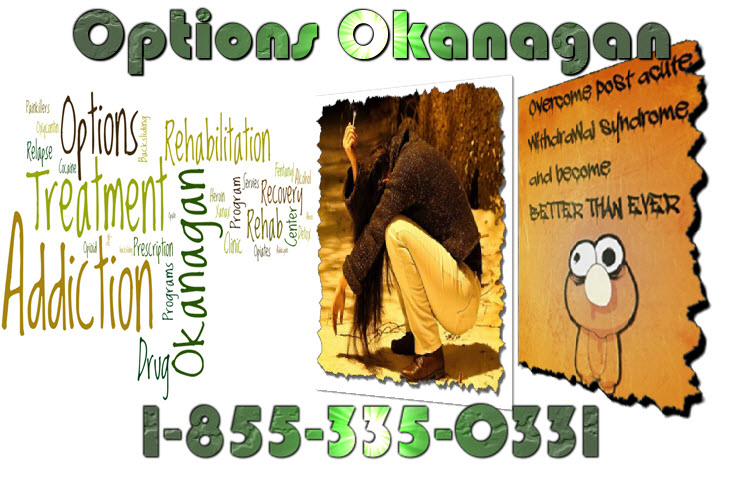Vancouver, British Columbia: Post Acute Withdrawal: How Long Does It Last? Part 01 | Vancouver, Victoria, Kelowna , British Columbia | Options Okanagan Treatment Center in Kelowna, British Columbia treating Opiate addiction and recovery.
Many addicts that are in addiction recovery want to find out the length of time post acute withdrawal symptoms last. The truth is, that’s the most often asked question about this condition. On the other hand, for every individual the answer is distinct. The good news is, there are various different factors that a person can influence effectively to assist with decreasing both the duration and seriousness of symptoms. Taking into account the number of addicts that report having post acute withdrawal symptoms for over 2 years, it is something that is very important to be aware of. The following are a few of the factors that have an effect on how lengthy symptoms can last.
Type of Drugs
The kind of substance that was used significantly affects how long post acute withdrawal symptoms last. It is widely considered that the most severe symptoms are caused by opiates when the addiction was chronic and acute- that is particularly true when the opiates that the person was addicted to were treatment drugs like Methadone, Naltrexone or Suboxone. Methadone addicts and hard-core heroin users report having long term symptoms that may last for as long as 2 years, and in some cases even longer.
Quite often long term alcoholics struggle with having symptoms for a long time after completing their drug treatment programs. Difficulties have been reported by some former chronic alcoholics of having post acute withdrawals for a number of years, and is some cases even decades after the person has stopped drinking. However, the duration and severity of the symptoms depends at least partly on some of the following factors.
Drugs that have typically briefer post acute withdrawal symptoms include ecstasy, cocaine, hashish, marijuana and benzodiazepines. (Note: although symptoms that are caused by being formerly addicted to benzodiazepines are not believed to last as long as other kinds of chronic addictions, the initial cessation as well as withdrawal from the drug class can potentially be dangerous. Before detoxing from alcohol or this substance you should consult with a physician or other medical professional)
Nature of the Specific Drug Abuse
Generally speaking, the more long-lasting and severe the active addiction period and substance abuse was, the more severe and longer the post acute withdrawal symptoms will be. For example, an individual who abused heroin for 5 years chronically while developing multiple addictions and switching between various drugs over a long period of time will most likely have other symptoms and ones that last longer than an individual who abused cocaine for 6 months and few or no other drugs. Using and mixing drugs from the top part of the drug hierarchy (Fentanyl, heroin, etc) tends to result in symptoms that are more severe following withdrawal and detox.
Drug Abuse Duration
The longer that an addict is actively in the state of addiction and substance abuse, the longer that the post acute withdrawal symptoms tend to last. For alcoholics who drank for ten years or more, they are much more like to have symptoms beyond the first few years of their sobriety compare to an individual who used meth for one year.
Prior Drug Withdrawals and Relapses
The more times that an individual has withdrawn and then relapsed from a substance, the more long lasting and severe their post acute withdrawal symptoms can be. The Kindling Effect is what causes this, where subsequent relapse periods cause increasingly severe acute withdrawal syndrome symptoms. In turn the Kindling Effect is caused by the brain’s decreasing ability to handle stress in addition to individual nerve cells significantly changing and the functioning overall of neuronal wiring which is a response to damage that is caused by neurotransmitter and drug interactions.
Part 02 Oct 10,2016 – Post Acute Withdrawal
Options Okanagan Opiate and Alcohol Treatment Centers in Kelowna, Salmon Arm and Vancouver, British Columbia – Men and Women are recovering and healing from Alcohol and Drug Abuse at our treatment center here in the Okanagan right now.
Our unique and distinctive Opiate Drug and Alcohol treatment program allows men and women to come in from Calgary as well as Edmonton as we offer airport pickup.
Numerous clients come to us from Vancouver, Calgary and Edmonton and other locations in Alberta and even other provinces for Opiate addiction treatment, meth drug treatment, many other drug and alcohol addictions for rehabilitation because of the uniqueness of our treatment center.
Our Treatment Location:
Options Okanagan Opiate Treatment Center
551 Sherrydale Crescent, Kelowna, British Columbia, V1V 2E6
Toll Free Phone Number : 1-855-335-0331




